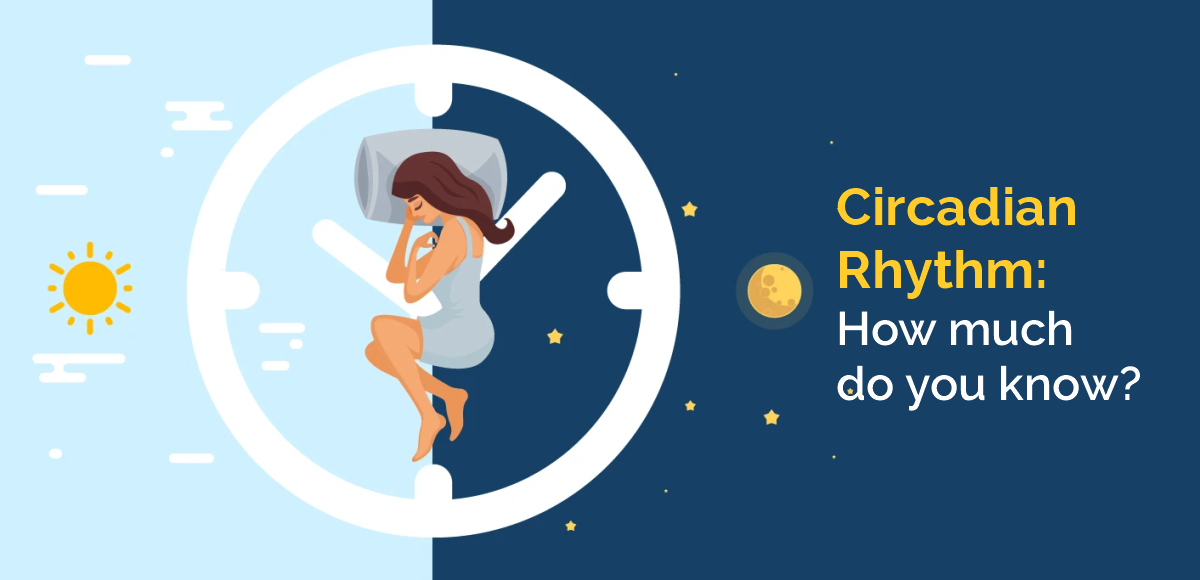

06
Oct
2021
Circadian Rhythm: How much do you know?
Circadian Rhythm is Controlled By:
Visual cues such as brightness/type of light, time spent in the presence of light, and when exposed to light all help to "set your internal clock" over the course of a 24 hour day. Your eyes send light to a part of your brain called the "control centre," where it is processed. However, other factors such as melatonin (a hormone produced in your brain that affects sleep), physical activity, and social behaviours can affect your body's internal clock. Your responsiveness to the snooze cycle may change as you get older. Consult a Doctor with Assurance because we diagnose and connect you with the perfect healthcare practitioner.
What are sleep disorders of the circadian rhythm?
A sleep disorder characterized by a disruption in sleep timing is known as a circadian rhythm sleep disorder. The 24-hour "internal clock" in your body is known as the circadian rhythm. Your body's sleep-wake cycle is managed by your internal clock.
An issue with the circadian rhythm of your sleep is one of the following:
- You're having trouble winding down and getting to sleep.
- You have a hard time falling asleep and frequently wake up during the course of the night.
- You're unable to sleep because you woke up way too early.
- What are the most common forms of irregular circadian sleep patterns?
Some common disorders of the circadian rhythm sleep cycle are:
People with Delayed Sleep Phase Disorder (DSPD) go to bed and wake up two hours later than those with a normally timed sleep-wake cycle. It's possible, for example, that you're something of a "night owl" who can't sleep until 2 or 3 a.m. but then stays up until 3 p.m. most days.
Delayed sleep phase disorder is characterized by the following symptoms:
- When you're tired, you're at your most alert and creative.
- If you have to get up an hour earlier because of your job, you'll be tired all day.
- If you're consistently running late for work, people may think you're unreliable or unmotivated.
- Teenagers and young adults are the most common demographics affected.
- It may be hereditary.
A sleep disorder in which you go to bed early in the evening (between 6 and 9 p.m.) and wake up early in the morning is known as advanced sleep phase disorder (2 a.m. to 5 a.m.).
Advanced sleep phase disorder is also characterized by the following symptoms:
- You're usually tired in the mid-afternoon because of early morning awakenings or insomnia.
- People in their middle and late years are more likely to experience this.
- It may be hereditary.
What is the root cause of irregular circadian sleep patterns?
Circadian rhythm sleep disorders. Disruption occurs when your "internal body clock" doesn't work properly or when your "internal body clock" is out of sync with the demands of your external environment (such as social or work obligations), affecting the quantity and timing of your sleep. This circadian incompatibility makes it difficult to function properly at work, school, or in social settings.
Circadian rhythm sleep disorders can be triggered by a variety of factors, including the following:
- Frequent shift changes.
- Experiencing jet lag as a result of travel.
- Frequent alterations to bedtime and wake-up times.
- Stroke, dementia, and traumatic brain injury can all cause permanent brain damage, as well as intellectual disabilities.
- Blindness or long-term lack of sunlight exposure.
- Lack of restorative sleep (lack of practices, habits and other factors that promote good quality sleep).
- Certain medications.
- Age.
What are the signs and symptoms of irregular circadian sleep patterns?
Circadian sleep disorders have the following symptoms:
- Anxiety about falling asleep (difficulty falling asleep or staying asleep).
- Daytime drowsiness that is out of control.
- Having a hard time getting out of bed in the morning.
- Sleep deprivation is a problem.
- Depression.
- Relationship tensions.
- Inability to perform well at work or school.
- Failure to meet one's responsibilities in the community.
Consult a psychiatrist with Assurance at the earliest to ensure you get the medical attention you seek.
Circadian Rhythm and The Heart Connect:
The circadian clock influences blood pressure, heart rate, and other cardiovascular functions, including endothelial function. Cardiovascular disease, such as heart failure, myocardial infarction, and arrhythmias, is caused by the disruption of 24-hour rhythms.
How can Assurance help me?
Assurance by NanoHealth provides Disease Management Programs, including PCOD care, infertility, Heart care, etc.
Why us? Our AI-driven initiative helps timely identification, diagnosis, and treatment by pairing you with the proper care providers.
Our disease care management programs include:
- Regular interactions with your health coach for treatment adherence.
- Periodic doctor consultations to ensure effective treatment.
- Routine blood tests to track the progress and improvements.
Book an appointment with fertility specialists from anywhere & anytime today to get a carefully assessed and curated meal plan to headstart your healthy journey. Head over to our website nhassurance.com and consult a specialist today!
